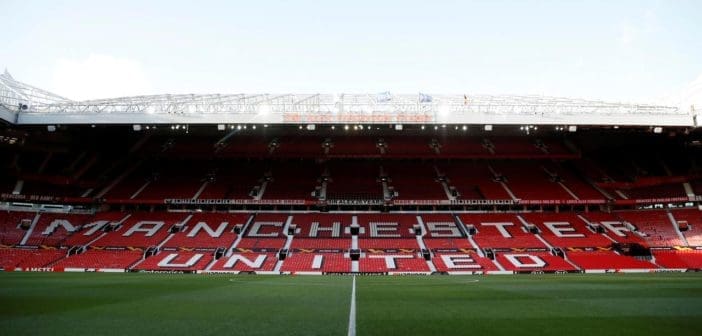I had a dream one night. Or was it a nightmare? The whole world had been attacked by some sort of deadly virus. Everything was on stop. There was no-one in the office. Nobody on the streets. The shops were closed. And everyone went around wearing face masks.
Then one business, only one, was allowed to flout the rules. Because of its money and undoubted influence professional football was allowed to go back to work early.
‘We can test everyone,’ it said. ‘We can all isolate in posh hotels. We’ll be alright.’ And besides think of the money there was to be made from all those games on TV without having to bother with those troublesome fans. A win for everyone involved I think you’ll agree.
But what is it like to actually be at a game without fans during the Covid lockdown? Having watched the early ‘behind closed door’ matches on TV I was itching to know what, if any, atmosphere there was inside the stadium itself. Who would actually be there? And how would you react when your team scored?
So I jumped at the opportunity to cover the last scheduled game of the 2020-2021 season at the Cardiff City Stadium. It was a biggy. Just one point would mean my beloved Bluebirds flew into the Championship play-off semi-finals, destination the Premier League. The opponents, Hull City, stuck at the bottom of the second tier, were staring relegation in the face. Following the enforced Covid break for we Bluebirds the longest season on record was about to become even longer.
Delighted as I was to at last be seeing my team play for real it was all a slightly unnerving experience. This was the first time I had ever parked at the ground on a match day. You do feel rather grand driving through the barrier and parking smack bang outside Rec
eption. Stewards who I thought I recognised behind their facemasks shepherded me to a distant entrance. My temperature was probed with one of those plastic handguns I’d seen in China. And then I was asked to fill in a medical questionnaire before being given my pass and shown to my seat which was clearly marked with yellow tape.
There were some twenty of us media bods scattered across the press box and a stretch of the Grand Stand. The silent pre-match build up was broken every so often as the radio reporters piped up, speaking animatedly into the microphone for a few seconds. And then, silence, as we all looked down at our iPads on notebooks.
I peered over the pitch longingly at my usual seat in the Ninian Stand, empty and sad under the dying summer light.
The tannoy blared away, the same bland pop as ever, only the volume was not as high as usual. As the teams entered the stadium they played Cardiff’s unofficial pre-match anthem, the rousing war cry, ‘Men of Harlech.’
We usually sing it in something approaching unison. But today the words were not flashed across the electronic advertising hoardings and in place of 20,000 people only the odd security guard clapped as we all usually did at the end of each line – a tinkling of support from hollow pockets around the ground.
The announcer went through both line-ups as he does but there was no applause for our heroes, no jeers for the opposition. It seemed a bit odd: the footballing staff and the media would have had the players’ names and numbers in advance. He even offered his normal last gasp match day encouragement shouting “Cardiff City.
The Bluebirds” with his voice crescendoing to an expectant high. And once again – silence. Then came the whistle.
As the game kicked off I was unsure whether fake ‘atmosphere’ was to be pumped into the ground. Some clubs do this to try to replicate at least the sound of a full house. Others, and Cardiff was one of them, left us to paint our own aural pictures.
I asked Laurence, a journalist colleague of mine, what he thought of it all. He had covered quite a few matches during lockdown. At one club they had sound effects at the stadium but the audio person hit the button sounding a massive cheer for a goal just as the ball was cleared off the line. As they say, ‘You had one job.’
Cardiff City needed only a draw to seal their position in the top six but they showed a hunger to win from the very start. They played with real confidence and for once I knew it was only a matter of time before they would score. And so it proved. Junior Hoilett chested the ball down before smashing it into the bottom corner. Cue a few echoing handclaps and maybe a fist pump from the bench. It never entered my head to jump up and shout. Call it normative behaviour but I just wrote down Junior’s name, the details of the move and the goal time.
Hull should have had a penalty but nothing was given. Their manager remonstrated with the fourth official. He seemed to calm down more quickly than is usually the case. And then it was back to business. Maybe this normative silent behaviour works all round the stadium.
Both sides had good chances but Cardiff broke away again and following a corner our captain Sean Morison made it two nil with a firm header. Two nil up in the first half! In normal time we would have been going berserk. Again though I nodded knowingly and diligently marked my notepad.
Watching games on TV at home during the lockdown we had switched streams to get the commentary plus the crowd sound effects. It seemed so much more real with the commentators having to speak over the unreal electronic fans.
When Cardiff were not on Sky or the BBC we would watch the game courtesy of Cardiff City and the Football League’s own streaming service. At first we were dismissive of the club’s media team’s attempts to ape John Motson et al.
The commentary was not polished, not the kind of thing you had come to expect over the years. However, after a couple of matches you listened to the incisiveness of their comments. These two guys understood football the way we did.
They were fans too but they also had something that we didn’t have – knowledge. Formations and positional changes were dissected along with the usual naming of players and description of the bleeding obvious. They may have been ‘amateurs’ but their refreshing approach to the job offered so much more.
I was left wondering why all the mainstream media seem to have adopted the same bland style of commentary. Professionalism? Maybe, but it’s as if there is a fear of showing any spontaneity or individuality on air.
At half time I turned to the guy sitting next to me, well three seats away actually. He was a scout from Fulham. ‘Are you watching anyone in particular?’ I asked. ‘Not really,’ he said and turned back to his notebook. The pages had goals and pitch markings on them whereas mine had lines.
I was a bit jealous. He told me that his club had sent someone to watch all three of the Cottagers potential opponents in the play-offs – Swansea and Nottingham Forest as well as him here at Cardiff. As it turned out he was at the right match. Cardiff would face Fulham in the semis.
The disadvantages of playing in empty stadium extend beyond the loss of atmosphere and revenue for clubs. Having no fans also removes the so-called ‘home advantage’ whereby statistically a team does better when playing at home.
Referees are only human and apparently a noisy home crowd can influence the decisions the officials make on fouls, yellow cards and the like. They will also allow less added time when the home team is winning but more when they are losing thereby giving the home team an extended opportunity to at least draw the game.
A study of European football has shown that without fans any such advantage is all but wiped out. The academic network ‘The Conversation’ showed that home teams win only 36% of the time when the stadium is empty. The away team wins 34% of the time. There really is very little difference.
I have some vague memory of an experiment which tested the saliva of players before matches. It indicated that there was more testosterone present in the home team’s bodies thus giving them a small extra physical lift. A very basic ‘defend our home’ emotional response apparently brought about genuine physiological changes in players. I like this theory but think it may also be macho pseudo-science I gleaned sometime in the 1970s.
As play resumed for the second half so did the noise from the pitch and the touchlines. If the coaching staff shout and swear as much as this during a normal game then I must have been a little deaf for more than a quarter of a century. Maybe they thought that they could be heard by the referee in the otherwise quiet stadium. I do wonder though whether appealing a little less often might be more productive. There’s another one for the scientists to dig into.
Hull started much more brightly in the second half. Wilks came close, a swivel and a volley to the bottom corner, only for the shot to be saved by the Cardiff City keeper. The Tigers roared, but not for long. Cardiff made sure of the win in the 82nd minute. Bennett’s free kick bounced off the keeper only for the substitute Danny Ward to follow up. There was going to be no way back for Hull but despite this absolute trouncing I did not feel any real emotion. Of course I was glad of the win and to be there to witness it but I was one step removed from it, oddly depersonalised.
I have tried to work out why fans are so important at matches. The ‘buzz’ we associate with supporting your team is more than just sitting together. It’s the pre-match drink and the discussion of team selection and tactics on the walk to the ground. Under the stand you nod to people you may or may not know because we are all in this together. It’s the Werther’s toffee handed down from the old man from Cwmbran who sits behind me. It’s the smell of old oil frying soggy chips. Of course the game itself is central to all this but it is not in itself the whole experience.
It used to be vital for me to be there for a game, to actually see your team, win, lose or draw. Family holidays were never booked until the new season’s fixtures came out. Tickets for away games, particularly when our allocation was limited, were sold and traded for old favours and friendships.
Back in the bad old days Cardiff fans were banned from Swansea. I managed to get in to an away game using my reporter’s badge. The Vetch Field was a cauldron of anti-Cardiff sentiment. That night I sat on my hands, literally, so that when we scored I would not jump up and cheer. That was twenty odd years ago. Something has changed. It may be me.
Losing the link to your local team which fielded even a few local players, all seater stadiums, high ticket prices and foreign owners – take your pick. For me, without supporters, there was no true passion in the ground. It was all so, professional. It may have been my status as a reporter but unlike my usual engaged and frenetic self I adopted the detached attitude of the neutral.
This Covid ‘empty ground’ season will not be a short lived phenomenon. Not even football’s money masters will be able to wholly ignore government health regulations. Social distancing and empty seats are here to stay for some time. When football restarted behind closed doors in June 2020 we Cardiff season ticket holders were given a code for a live stream of the remaining games. But what of the next season? There really is no guarantee we will be watching live football any time soon.
Before the season ended we were asked to pay in advance for our season tickets. Until such time as we can return to our seats we will again be offered that jerky television stream which normally cost £10 a game. (Those in the Premier League don’t even get that.) For the clubs it’s business as usual only without the paying fans, those same fans who will be paying anyway.
At the final whistle that July night despite Cardiff City having made it to the play-off semi-finals there were no celebrations. There had been passion alright but it had all been on the pitch. 22 professional players playing a professional game.
To his credit the Cardiff manager Neil Harris commiserated with the Hull team as the players traipsed down the tunnel to League One. There was polite applause from the three people in the Directors Box and the media scribbled their own thoughts in that measured, unbiased way of theirs.
Me? I trudged out into the night happy with the win but nervous for the play-offs. Had I enjoyed supporting my team in a crucial end of season match even in these bizarre circumstances? Sort of. I was glad to have witnessed a game behind closed doors but I am not sure I would do it again. Professional football without fans is a strange affair indeed.
Follow us on Twitter @ProstInt
EPL
News
![Prost International [PINT]](https://prostinternational.com/wp-content/uploads/2021/08/PINTtFontLogoRoboto1536x78.jpg)


